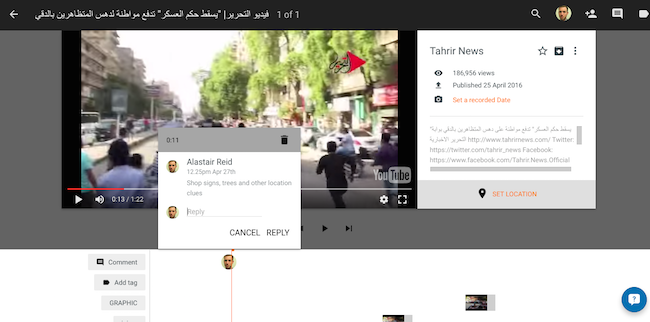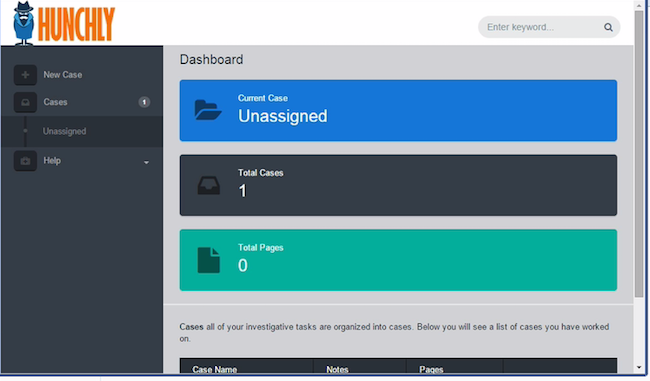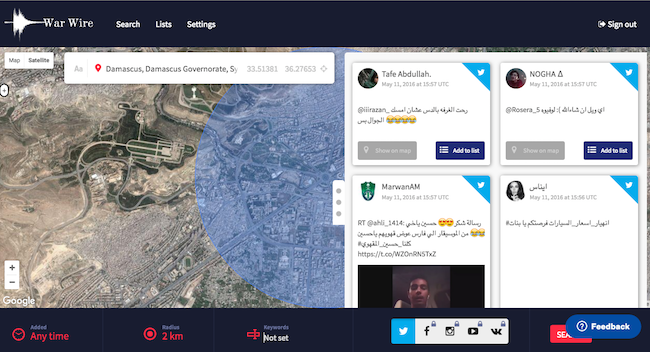With open-source information becoming an increasingly popular source for investigations, a growing number of tools and platforms are being released to aid with the investigative process. Tools like Checkdesk, Bridge, Yomapic, and Echosec are now being joined by new and upcoming tools and platforms that will make the investigative process even easier and more powerful.
Montage
Jigsaw (formerly Google Ideas), in partnership with Storyful, recently released Montage, a platform the allows users to collaboratively organise collections of YouTube videos (disclosure: Google and Storyful are members of the First Draft coalition). Videos can be searched for through the platform, then added to collections where specific moments in a video can be tagged.

Screenshot from Montage
This simple concept allows for the creation of useful datasets from YouTube videos. The Carter Center has already been using Montage to analyse the conflict in Syria, creating interactive maps tracking the front lines, and examining other aspects of the conflict.
While the focus of the tool is conflict reporting it is flexible enough to be used for any kind of event that creates a large number of YouTube videos. It’s equally capable of creating collections of tagged Donald Trump speeches as it is tracking ISIS atrocities, the only limit being the tastes and interests of the users.
Price: Free.
Hunch.ly
Hunch.ly is an upcoming Google Chrome extension and database designed to assist with online investigations. Hunch.ly organises information during online investigations by tracking the activity of the investigator on the browser, continually creating snapshots of websites as they are visited and storing them in a case file for each investigation.

Screenshot from Hunch.ly
This means that even when a website is deleted an archived copy is available for the investigator and, more importantly, the archive is encrypted in such a way that it can be shown the page has not been altered after the archive was created.
Hunch.ly also allows for multiple search terms to be predefined so whenever one of those search terms appears on a page it is automatically highlighted. As more search terms are added, archived pages are also searched and highlighted to the user if the term is discovered.
Hunch.ly also tracks the history of searches and websites visited, making it easier to retrace your steps in an investigation, all-in-all solving many of the problems faced during online investigations.
Price: Early access is currently available at $99.99 Canadian dollars. Hunch.ly creator Justin Seitz told First Draft the first public release will “likely be in the $149 to $199 range”.
WarWire
Another upcoming tool is WarWire, which joins platforms such as Yomapic and EchoSec in allowing users to search for geotagged images. WarWire currently searches YouTube, Twitter, Facebook, Instagram, and Vkontakte for geotagged posts, and has some additional features that sets it apart from other, similar platforms.

Screenshot from WarWire
WarWire can be set up to monitor locations, keywords, or social media accounts for activity, allowing for continued observation even when the investigator is not online. Curated lists of accounts can also be created, and these accounts can be shared with other users, making collaboration on projects easier.
WarWire adds to the range of tools for the searching social media, and more features are being developed to make it an even more useful tool for investigators. WarWire is currently on a free beta period and will be live in the coming months.
Price: Warwire will be available on a $15 monthly subscription once open to the public.
Check out more tools for open-source investigations, newsgathering and verification in the First Draft Toolbox
One thought on “3 new and upcoming open-source investigation tools to check out”
Leave a Reply
You must be logged in to post a comment.







I couldn’t refrain from commenting. Well written!